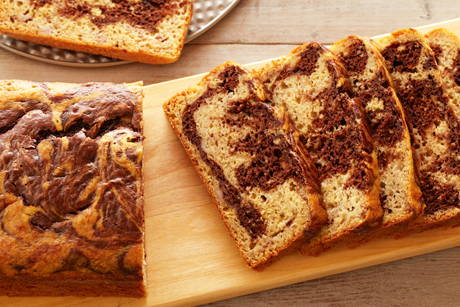
If we could sum up our collective baking experience in 2020, it would boil down to two words: banana bread.
When the global pandemic first upended our everyday lives back in March, many of us turned to baking. It didn’t matter whether or not we were seasoned pros, we all seemed to crave the baked goods we cherished as kids. (Think: cookies, muffins, bread and pies). There was something comforting about the familiar smells and tastes — and it had many of us resorting to a form of culinary therapy in a time of uncertainty. You couldn’t scroll through your Instagram feed without coming across dozens of bread loaves conjured up by even the unlikeliest bakers in your friend group.

Get the recipe for Healthy Marbled Banana Bread
So, what gives? Why now, in the midst of the second wave of COVID-19, have we once again turned to baking — albeit with a distinct holiday sparkle this time around. As it turns out, our desire to bake when the going gets tough actually has deep psychological roots that can be traced back to our childhood.
Dr. Brent Macdonald, of the Macdonald Psychology Group in Calgary, has more than 20 years of experience in the field — and is more than familiar with the various intricacies of the human brain when it comes to food associations.
Related: Our Fave Food Trends to Come Out of Quarantine, From Pancake Cereal to Bread Art
“[Baking or cooking] can remind you of the positive experience of sharing it with family, of being cared for and comforted as children — and that same emotional transference happens in adults,” he explains. “The smell, the taste, the texture, the experience of eating something that brought you pleasure as a child brings up all those positive emotions of comfort and warmth.”
As Macdonald notes, it’s no mere coincidence that we seek out these familiar foods in times of strife. For many, it’s a form of mindfulness — even if we don’t realize it. “We tend not to have [comfort food] when we’re doing well — we typically have it when we’re feeling stressed. That’s our medicine, in a sense,” he says. “The good thing about it is that it works — comfort food and comfort baking makes us feel better. And that’s not necessarily a bad thing — we shouldn’t feel shame or embarrassment that we have comfort foods we enjoy. It kind of gets a bad rap because of its association with sugars and carbohydrates — and fair enough. But once in awhile, treats are treats for a reason.”

Get the recipe for Fudgiest Sweet Potato Brownies
But given this whirlwind year where many have faced significant social and professional upheavals, Macdonald says it’s still important to take note of how consuming these baked goods makes you feel — aside from sentimental reminders of Grandma’s kitchen.
“Does [comfort baking] make you feel good and just feel good? Or does it make you feel good temporarily, masking some really unpleasant emotions that come back immediately once you stop eating? Because that’s an unhealthy pattern,” Macdonald says.
So, what’s the actual science behind this feel-good attachment we have to baking? Over the years, researchers have shown evidence that the act of baking triggers various parts of our brain, including the amygdala (the part of our brain where emotions are given meaning) and the hippocampal cortex (memory retrieval) which can ultimately help us reduce stress and anxiety. Therefore, a simple scent — vanilla or melted butter — can take us back to the relative safety and comfort of our childhood, thus inspiring in us the desire to recreate the recipes we indulged in during our “stress-free” younger years.

Get the recipe for Perfect Fermented Sourdough Bread
And with certain scents you can almost feel the power of those neuroreceptors firing off, Macdonald says. “We start to drool, to salivate, as our body prepares to ingest the food. It’s similar to people who have nicotine cravings. All of those things set off an anticipatory response that is waiting for that intake.”
So, with the holiday season upon us and no sign of COVID-19 abating before the end of this strange year, indulge in a little feel-good baking — whether you’re a novice or pro. After all, it’s one of the most budget-friendly therapeutic activities you can engage in — and the end result tastes delicious. Happy baking!
Try your hand at these classic Christmas cookies that will spread holiday cheer or these bountiful bread pudding recipes you’ll make over and over.
